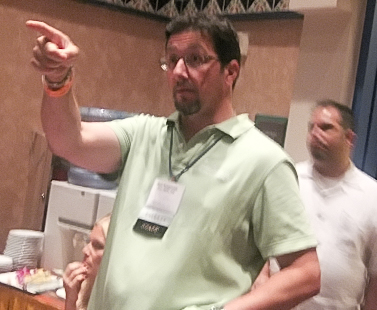Dreaming up a diabetes center

Kaitlin Spears, a 9-year-old Pinellas County resident, doesn’t let her insulin pump stop her from coloring on the floor during a USF focus group at the Children With Diabetes conference.
If you imagined the perfect place for children with diabetes, what would it have?
For families of these children, the list is long and varied: Health professionals who really understand diabetes. Less time waiting to be seen. Someone available to answer questions at all hours of the day, who can tell parents what to do when their child’s blood sugar is too high at midnight.
A medical center that has healthy extras: a gym, a kitchen, and a children’s play area.
More places to learn about diabetes and more people to teach it.
And, maybe most of all, each other.
“To meet other people” with diabetes, said Clearwater parent Scott Roan. “To learn from others.”
Those were among the items on the wish list at an unusual focus group meeting hosted by USF Health Wednesday in Orlando at “Friends for Life,” an international conference sponsored by Children With Diabetes, Inc. USF invited families there to brainstorm. The university is planning a new center for people with diabetes and wanted to hear from families about their needs.
The focus group, led by Nicole Johnson, Miss America 1999 and director of communications and education for the USF Diabetes Center, became a standing-room only crowd. It included parents and children with diabetes, as well as doctors and other health care providers.
Two other USF Health staffers – Michael Hoad, vice president of communications, and Jay Wolfson, assistant vice president for health law, policy and safety – prepared to help Johnson lead the focus group by getting some first-hand experience. Johnson made both men spend 24 hours wearing an insulin pump. Johnson has Type 1 diabetes herself, so the ones they wore were just like hers: hot pink.

The hot pink triplets: Jay Wolfson, Nicole Johnson and Michael Hoad (L to R) show off their matching insulin pumps.
Parents told the USF trio that finding out your child has diabetes is an overwhelming, often isolating experience. With that moment of diagnosis, their lives changed forever – yet they often felt lost. They had been thrown into deep water with little knowledge and fewer resources.
“You’re sent home and supposed to be Dr. Mom,” said Tampa parent Alysia Ekizian. “It would be great if there were someone you could get 24 hours. We, as parents, need constant coaching.”
Parents often feel that they don’t have anywhere to turn for that kind of help. What’s more, outside of their children’s endocrinologists, sometimes even the medical professionals seem to know little about their problems. Roan once brought his daughter to the emergency room because she was suffering from ketosis, a condition that occurs when chemical ketones start building up in the body because insulin is too low and the body starts breaking down fat for energy. Because insulin levels are low, blood sugar levels also rise.
“They come back and say, ‘Did you know, her sugar is high?’ ” Roan told the group with exasperation.
Another parent said one doctor told him it was the first time he had ever seen an insulin pump.
Such stories are one reason USF Health wants to develop a center that specializes in care for diabetes, Wolfson said. Studies have shown that when diabetes patients need other medical care, whether it’s for having knee surgery or giving birth, caring for their diabetes often gets lost in the shuffle.
“Things break down a lot,” Wolfson said. “They don’t seem to be able to coordinate with your diabetes.”
Health care providers aren’t the only ones with that problem, said Holly Plotts, a Pennsylvania mom whose teen-age daughter has diabetes. Parents sometimes find that schools are reluctant to let children check their sugar or carry snacks, and may not know that federal law requires them to accommodate diabetes.
Pennsylvania cardiologist Bob Bulgarelli told the group that he envisions a diabetes center where patients don’t feel like they’re visiting an uncomfortable doctor’s office. No exam rooms with paper on the tables, he said. Lamps and cozy furniture. A gym and a kitchen, so people can practice the healthy eating and exercise habits that are so important to diabetes.

Cardiologist Bob Bulgarelli talks about what diabetes patients need.
“It needs to be more than your standard terrible box office,” Dr. Bulgarelli said. “It can be a place they can spend the day.”
Again and again, parents returned to the importance of having children be able to meet other children with diabetes . They want their kids to play with other kids who wear insulin pumps. Kids who don’t think it’s weird to check your blood sugar. Kids who understand how you feel when your blood sugar gets low.
The best part of the Orlando conference, parents said, was to watch their children doing exactly that. Imagine a center where parents could do that in their own hometown, said Adina Singer, of Quebec. She envisioned a place that would provide health care, yet also be something of a hub for the diabetes community. It could host support groups, social events, even the occasional party.
“You want to recruit families. You want families to join you and stay with you for years and years,” Singer said. “You want to create something that’s more inviting… A place where people are going to want to come.”
— Story and photos by Lisa Greene, USF Health Communications

